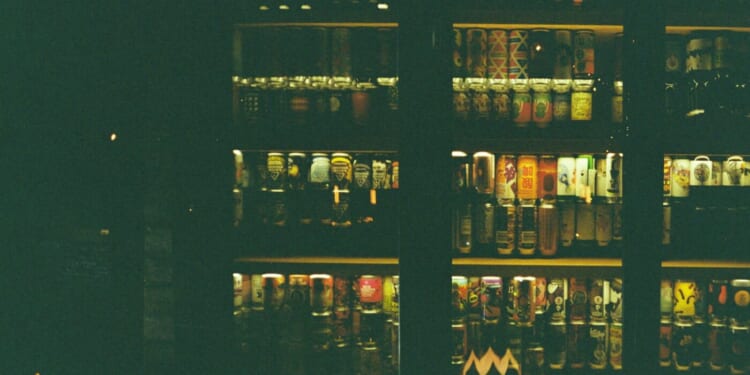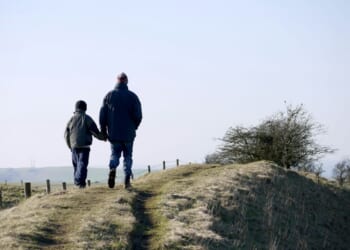I used to stand at the front of church every Sunday, guitar strapped on, leading worship songs for a growing Lutheran congregation. People saw a devoted man of faith, pouring his heart into ministry. What they didn’t see was the vodka hidden in my water bottle.
On the outside, I looked steady. On the inside, I was crumbling. Addiction has a way of making you live two lives—the one everyone applauds, and the one you pray no one discovers. I told myself that as long as I kept showing up, smiling, and strumming, maybe the cracks wouldn’t show. But they did.
My son was the one God used to break through my pride. At sixteen, he surprised me with words that stopped me in my tracks: “Dad, I think we’re supposed to be Catholic.” Everything in my upbringing had taught me to distrust the Catholic Church. I was raised in the Church of Christ in West Texas, where we were told the pope was the antichrist and Catholics were misled. But my son wouldn’t let it go. He showed me Matthew 16, where Jesus gives Peter the keys to the kingdom. He handed me the writings of the Church Fathers. I had never seriously considered them before.
That conversation sparked a year-long journey. I read, prayed, wrestled, and slowly I came to believe what I had always rejected: the Catholic Church is the Church Christ founded. I entered the Church with my family, convinced of its truth.
But here’s the part that often gets muddied: becoming Catholic didn’t magically erase my addiction. I carried the same struggle into the pews that I had carried at the altar as a Lutheran worship leader. The double life followed me. I wanted holiness, but I was still hiding.
Eventually, everything broke. My marriage was hanging by a thread, my faith felt like a mask, and I knew I couldn’t keep going. In desperation, I checked myself into a 30-day rehab. I thought it would just be about getting sober.
Instead, it became the crucible where God remade me.
A few days in, wracked with withdrawal, I decided I couldn’t take it anymore. I was ready to quit, to sign myself out, and to go back to the same destructive cycle. In that dark moment, I prayed—not with polished words, not with any pious confidence, but with raw desperation: “God, if You are real, I need You now.”
And He answered.
A calm swept over me in an instant. It wasn’t a vague feeling—it was peace that went deeper than my shaking body or restless mind. It was God’s mercy breaking into my chaos. In that moment, I knew I could stay. I knew I would finish the 30 days.
And I did.
When I walked out of rehab, it was my birthday. A coincidence, maybe. But for me, it was a rebirth in every sense of the word.
That moment changed how I lived my Catholic faith. It was no longer just about intellectual conviction—though the Scriptures and Church Fathers had been essential. It was no longer just about sacramental belonging—though entering the Church was a great gift. It became about surrender. About learning that in my weakness, God is strong.
Sobriety gave me clarity. Catholic faith gave me purpose. Together, they gave me back my life.
Today, I’ve been sober for over three years. My marriage has been restored. My sons know their father is present, not just physically but emotionally and spiritually. And I’ve learned that honesty about our wounds isn’t a liability—it’s the very place where God meets us.
That’s why I share my story. Not because it makes me look strong—it doesn’t. But because it shows that God’s mercy is stronger than our secrets, stronger than our shame, stronger than the habits that hold us captive.
If you’re reading this and carrying a hidden struggle, I want you to know you’re not alone. Maybe you look like you have it all together—church on Sundays, work on Mondays, smiles in between. But inside you feel like you’re falling apart. I’ve been there.
There is hope.
The same God who met me in a rehab center while I was still withdrawing can meet you in your darkest place. The Church isn’t a museum for saints. It’s a hospital for sinners. It’s where broken people find healing in Christ.
I titled my memoir Uncomfortable Truth because that’s what recovery and faith both demand. They ask us to tell the truth—even when it’s messy, even when it costs us our pride, even when it exposes the cracks in the image we’ve built. But on the other side of that uncomfortable truth is freedom.
My journey isn’t about my strength. It’s about God’s mercy—mercy that came through the persistence of a teenage son, the prayers of the saints, and the grace of the sacraments. Mercy that met me when I was ready to give up. Mercy that gave me a new beginning on the day I was born.
If He can do that for me, He can do it for you.
Photo by Semen Machin on Unsplash











